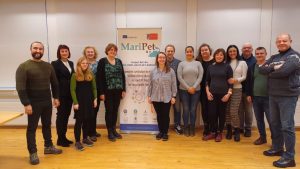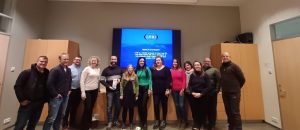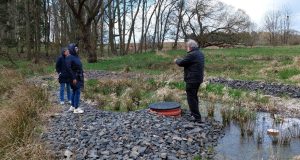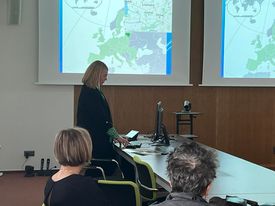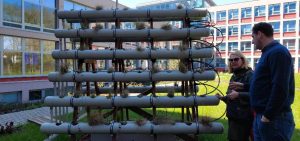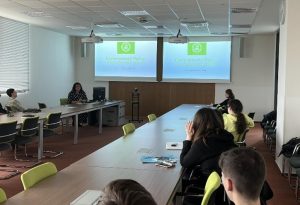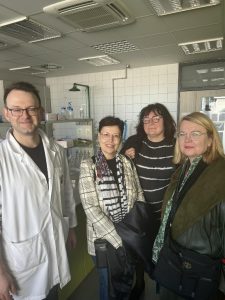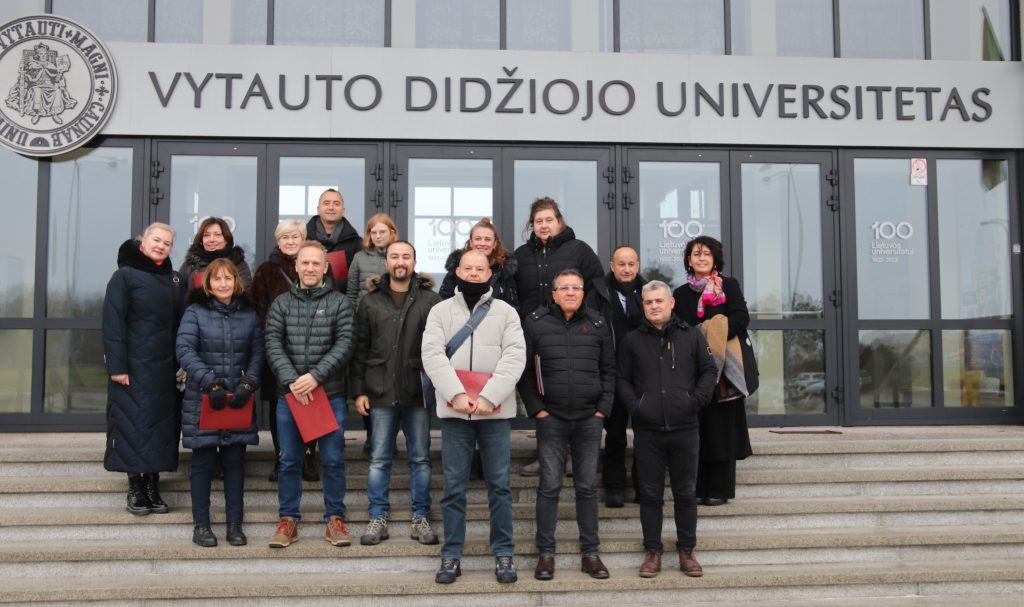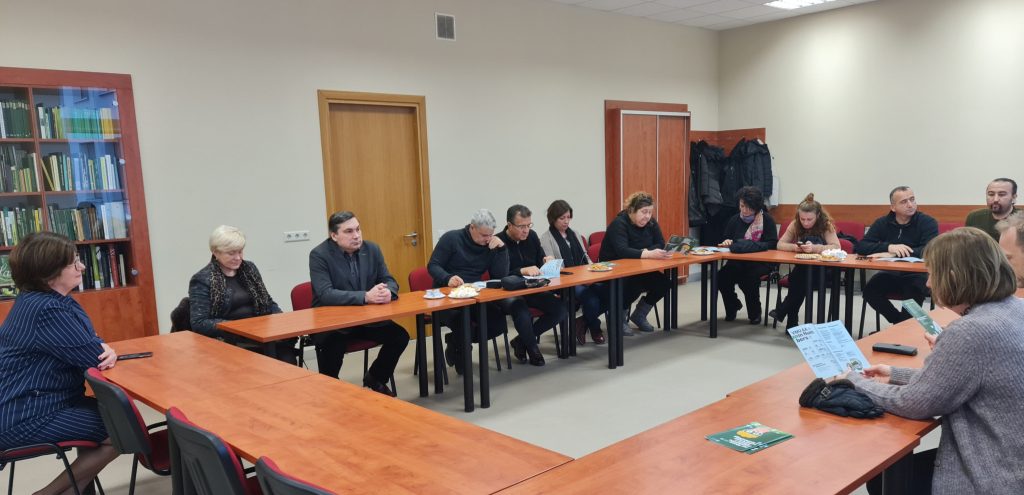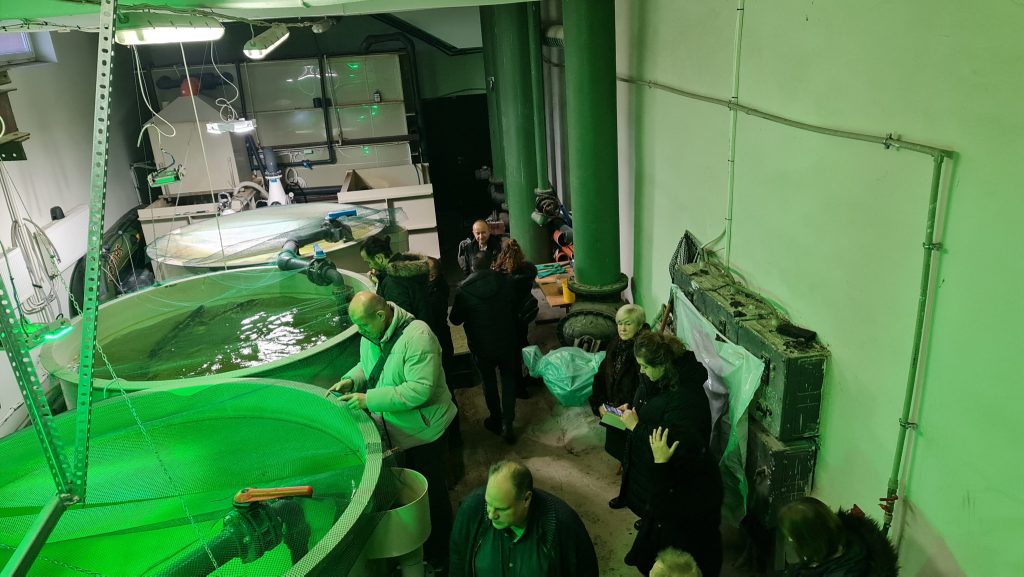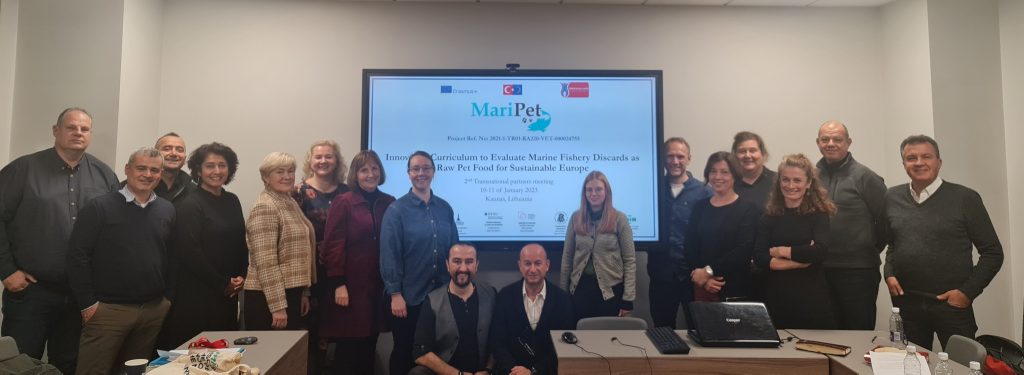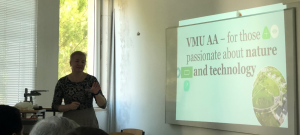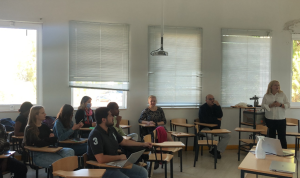SILVA Network Annual Conference. 16 – 18 April 2024 in Kaunas, Lithuania.
SILVA Network Annual Conference program.
VISIT OF TEACHERS OF VMU AGRICULTURE ACADEMY TO LATVIA UNIVERSITY OF LIFE SCIENCES AND TECHNOLOGIES
Vytautas Magnus University (VMU) and the Latvia University of Life Sciences and Technologies are long-standing partners of the Erasmus+ program. The teachers of VMU Agriculture Academy assoc. prof. dr. Midona Dapkienė (Department of Water Engineering, Faculty of Engineering) and prof. dr. Laima Česonienė (Department of Environment and Ecology, Faculty of Forest Sciences and Ecology) visited the Faculty of Environment and Civil Engineering under the Erasmus+ mobility program on March 19th to the 21st 2024.
The Faculty of Environment and Civil Engineering is the second biggest faculty of the University, where new engineers-construction, environment and water management specialists, land surveyors, as well as landscape designers and planners, are prepared. The teachers got acquainted with the material base of studies and scientific research and the innovative equipment. At the faculty there are four scientific laboratories and two of them are located in advanced two storey premises, which allows the use of all the functional possibilities.
The VMU representatives got acquainted with the organization of studies, teaching methodologies, currently ongoing research and scientific projects. The experience gained will be useful in improving the quality of studies at the VMU Academy of Agriculture and continuing cooperation in the field of science.
The teachers sincerely thank the professor of the Department of Environmental Engineering and Water Management dr. Ainis Lagzdins for his full assistance during the visit to Latvia University of Life Sciences and Technologies.
The 4th meeting of the Erasmus+ MARIPET project in Reykjavik
The fourth meeting of the Erasmus+ project “Innovative Curriculum to Evaluate Marine Fishery Discards as Raw Pet Food for Sustainable Europe” [MARIPET] took place on 28th and 29th November at the Agricultural University of Iceland in Reykjavík. Prof. Dr. Aušra Blinstrubienė, Vice-Chancellor of the Agricultural University, and Dr. Anželika Dautartė, Associate Professor at the Department of Environment and Ecology, participated in the meeting.
During the visit, the Vice-Chancellor met with Ragnheidur Inga Thorarinsdottir, Rector of the Icelandic University of Agriculture, to look into prospective scientific and educational collaboration.
Dissemination activities are scheduled to occur in all project nations in January 2024, as stated on the first day of the meeting, which focused on the completion of the project. The unique five-module curriculum, the online learning platform, the experts’ and producers’ platform for pet food, and the pilot testing of the curriculum in the first week of February were the main points of discussion. The manual/e-book on producing pet food from discarded fish has been finished in terms of organisation, publishing, and distribution.
On the second day of the meeting, a visit was made to the LYSI company. Founded in 1938, LYSI is one of the world’s largest producers of marine oil for human consumption and a pioneer in fish oil production. Today, more than 95% of LYSI’s energy consumption comes from renewable sources. LYSI is one of the main actors in Iceland’s policy to achieve full utilisation of all fishing industry inputs. As a leading expert in the production of valuable products from by-products and waste from traditional fish production, the company makes a significant contribution to the responsible use of natural resources.
Another site visited was BRIM, one of Iceland’s largest fishery companies. Responsible fishing and use of marine ecosystems ensures long-term interests and value creation for employees, shareholders, and society. The company measures its carbon emissions and decisions on fishing and processing here are based on economic and environmental considerations. The company is also committed to long-term carbon neutrality and has set a target to reduce its greenhouse gas intensity (tCO2/m€) by 40% between 2015 and 2030.
The project is coordinated by Ege University (Turkey), project partners: University of Balikesir (Turkey), University of Dubrovnik (Croatia), Agricultural University of Iceland, Izmir Metropolitan Municipality (Turkey), Norwegian University of Science and Technology, and Vytautas Magnus University.
The final meeting of the project will take place at Ege University on 7-8 February. The project will end on 28 February 2024.
The final Erasmus+ „Medicinal beekeeping for beekeepers“ [MEDI-BEEB] project meeting in Kaunas
The Erasmus+ international project “Medical Beekeeping for Beekeepers” (project No. 2021-1-TRO1-KA220-VET-000034632) began on February 27, 2022. Adnan Menderes University (Turkey) is the project coordinator; project partners include the Confederation of Italian Farmers of Umbria, Onsekiz Mart University of Cenakale, Wroclaw University of Environment and Life Sciences, Aydin Province Beekeepers’ Association, and Vytautas Magnus University.
The fundamental aim of this project is to inform primarily the beekeepers about apitherapy and to train them to produce bee products under convenient conditions at conscious, healthy and definite standards. Another aim is to build up awareness in the people for the importance of the producing, storing, and marketing the products used in apitherapy.
As time is fast running out, the 4th (final) international meeting of the project partners took place on 8 and 9 November at our university. On the first day of the meeting, a review of the work that had been completed was conducted. This included the development of training materials in a virtual environment, the creation of best practice videos, and the development of a mobile application to diversify, develop and increase the value of beekeepers’ products and their application in apitherapy.
The development of training materials in MEDI-BEEB project was preceded by a thorough analysis of the needs of target groups and the current state of art in the field of production, processing and storage of products used in apitherapy.
The training programme on healthy and accurate procedures in the production of bee and bee products which are expected to be used in the treatment of some human and animal diseases is primarily addressed to beekeepers and other target groups involved in production and marketing of bee products used in apitherapy.
The e-learning course includes ten modules in the field of proper production, processing and storage of bee products used in apitherapy, such as: honey, propolis, pollen, royal jelly, bee venom, beeswax and others. In addition, the course includes information on environmental contamination of bee products, standardization and certification of bee products and legal status of bee products and apitherapy. Each module consists of 25-30 slides fully integrated with e-learning environment. Moreover, the application of e-learning course for mobile phones is developed to facilitate learning and let trainee flexibly manage his/her learning time.
The course has been enhanced with numerous manual videos and podcasts with beekeeping experts on the practical production of high-quality bee products.
The innovative and user-attractive with numerous pictures, graphs and charts handbook content reflects the content of the e- learning course and will be available both in paper form and as e- book.
The pilot testing of the materials will take place in January in all partner countries, as well as face to face and virtual Multiplier event.
The project participants met with the Urbanbee.lt team of urban beekeepers on the second day of the meeting. Urban parks and gardens have lost their most essential pollinator due to the reduction of these insects. Wind alone has been inadequate for the task. Urban beekeeping is becoming more popular among city inhabitants across the globe. Socially responsible businesses install hives on the rooftops of offices, hotels, and commercial buildings, and the honey produced by bees is sometimes given as a corporate gift. The Urbanbee.lt team offers interested businesses a full range of services, including hive installation, ongoing care and responsibility for the bees, and packaging of honey in a representative container with the company’s emblem for corporate presents. MEDI-BEEB project participants engaged in a discussion about the prospects of urban beekeeping, found common links with Urbanbee.lt team members and made contacts that will lead to new project proposals in the future.
A series of finalising activities will take place in all project partner countries in January, including pilot testing of the produced training materials as well as face to face and virtual Multiplier events. The project will be completed on February 27, 2024.
More information click https://www.medibeebe.eu/
The third meeting of the project “Medicinal beekeeping – for beekeepers” [MEDI-BEEB] in Wroclaw
Bees provide a crucial ecological service by pollinating plants, which is essential for plant life. Beekeepers use these insects to harvest honey, pollen, bee pitch, royal jelly, wax, bee venom, and other useful and helpful elements for health. These products, however, must be produced in a secure and proper way.
The Erasmus+ project “Medical beekeeping – for beekeepers” (MEDI-BEEB) addresses these issues. Adnan Menderes University (Turkey) is the project coordinator; project partners include the Confederation of Italian Farmers of Umbria, Onsekiz Mart University of Cenakale, Wroclaw University of Environment and Life Sciences, Aydin Province Beekeepers’ Association, and Vytautas Magnus University. The third meeting of the project “Medical beekeeping for beekeepers” took place on May 16-17 at the Wroclaw University of Environment and Life Sciences (Poland). Prof. dr. Virginija Dulskienė and assoc. prof. dr. Anželika Dautartė of the Department of Environment and Ecology participated in the meeting. The training materials being prepared in a virtual environment, video topics of best practice examples are discussed here, to diversify, develop and increase the value of the production produced by beekeepers and its application for apitherapy purposes. Soon this information will also be available on the project website and mobile app. The final meeting of the project will be held on November 8-9 at our university.
More information about the project can be found at https://www.medibeeb.eu/
VISIT OF TEACHERS OF VMU AGRICULTURE ACADEMY TO CZECH UNIVERSITY OF LIFE SCIENCES PRAGUE
The teachers of Vytautas Magnus University Agriculture Academy assoc. prof. dr. Midona Dapkienė (Department of Water Engineering, Faculty of Engineering), prof. dr. Laima Česonienė and assoc. prof. dr. Daiva Šileikienė (Department of Environment and Ecology, Faculty of Forest Sciences and Ecology) visited Czech University of Life Sciences Prague (CZU) according to Erasmus+ Mobility agreement on April 17th to 20th 2023.
The Czech University of Life Sciences is a public university. Currently the University has more than 18 000 students (10% are international students), 6 Faculties and 1 Institute. CZU offers over 170 accredited study programmes at BSc, MSc and PhD levels (in 9 BSc, 20 MSc and 18 PhD programmes the language of instruction is English). The University has 1 700 employees, of which more than 700 are professors or associate professors.
The one of faculties of CZU – the Faculty of Tropical AgriSciences is a unique institution in central Europe. The mission of this Faculty is the higher education of foreign and Czech students in the fields of tropical agriculture, rural development and the sustainable management of natural and energy resources in the tropics. This experience would be useful in VMU Agriculture Academy, as a large number of students from various African and Asian countries are attracted to study in this Faculty.
The representatives of VMU Agriculture Academy gave the lectures for bachelor, master and Erasmus students of the Faculty of Environmental Sciences in the field of wastewater treatment and reuse, influence of climate change on surface water status, environmental policy and Green Deal.
The Faculty of Environmental Sciences is divided into six departments (Department of Water Resources and Environmental Modeling, Department of Applied Ecology, Department of Ecology and other) which cover the whole field of education and science at the Faculty.
The teachers had an opportunity to familiarize with the study process and reasearch at CZU, to visit the laboratories of Faculty as well as to discuss the possibilities of the joint project.
The representatives of Agriculture Academy also had an opportunity to visit Amálie Smart Landscape, located in a rural area near Prague. The Amálie site is one of the pilot projects of the CZU, in which experts are implementing specific measures to increase the adaptation of the landscape to climate change. On an area of approximately 500 hectares of agricultural land owned by the CZU, measures are being implemented, in particular to retain surface water, restore natural wetlands, secure erosion-prone slopes and monitor the hydrological regime. The Head of Department of Applied Ecology prof. Jan Vymazal showed all the components of the pilot, introduced to the goals of the ongoing project and the benefits of Smart Landscape.
The second transnational partners meeting of the Erasmus+ MARIPET project in Kaunas
Over three billion people depend on marine and coastal biodiversity for their livelihoods. However, today we are seeing 30 percent of the world’s fish stocks overexploited. FAO estimates that total fish production is 179 million tonnes in 2018 and about 88% of the mentioned amount was utilized for human consumption directly and the rest (12%) was described as used for “non-food purposes” and “waste”. Reducing by-catch and discard is an important issue for fishery management. Not only ecological impacts on biodiversity but also economical losses are enormously tragic problems worldwide. More than 40 fish species are caught per operation in bottom-trawl fishing, especially in Mediterranean waters because of its multi-species fishery characteristics. Among these, species that are discarded for various reasons besides those that are evaluated commercially have a significant amount in the total catch. A large proportion of fisheries production (35 percent of the global harvest) is either lost or wasted.
For this, it is aimed to provide training on the possibilities of using discarded fishery products as pet food by bringing them to shore. MARIPET Project intends to create an awareness to use discard products by captured-based fisheries into the pet food industry. Although fish meal and fish oil which are the most valuable feed ingredients in the fish feed industry have been produced by using discarded fishes, it needs still a huge amount of investment to create economically valuable products. By contrast, most of the discarded fishes can be used as “Biologically Appropriate Raw Food” (BARF). The barf diet is obtained by blending foods that are useful and nutritious for cats and dogs in certain proportions. It means biologically suitable raw foods which is a diet that has been formulated considering the diet of cats and dogs in their evolutionary process. The main theme of MARIPET includes more than one value chain step from the marine environment to pet food plant and any single step can create a difference itself. an innovative 5-module training programme, a virtual dedicated environment with an online education kit, platforms for discard fisheries and pet food trainers/experts and pet food manufacturers/experts, and an e-book/guidebook on European Discard Fisheries and Pet Food Production will be developed. The Training workshops and Multiplier events in five countries will finalise the project activities.
The project was launched on February 28, 2022; in 2023 January 10-11 the second international meeting of project partners was held at Vytautas Magnus University. Project implementation issues and the creation of training programme modules were covered during the meeting.
The meeting participants visited the Aquaculture Centre at the VMU Academy of Agriculture, where the centre’s director, A. Žibas, introduced the technologies used here, the scientific research being conducted, the fish species being cultivated, the daily challenges that arise, and expressed satisfaction with the centre’s accomplishments. The project’s achievements were reviewed with the chancellor of the Academy of Agriculture prof. Dr. Astrida Miceikienė and the dean of the Faculty of Forestry and Ecology prof. Dr. Vitas Marozas. The possibility of collaboration in arranging studies and performing scientific research was also addressed.
Tadas Laurinavičius, head of UAB Baltic Facility Management’s aquarium maintenance, introduced the project participants to the aquarium housed in PLC Mega. It is the largest and tallest aquarium in the Baltic countries, and it is ranked in the top ten in the world. The aquarium is 10 metres high and 4 metres wide, with a length of 11 metres and a water capacity of 170,000 gallons. With more than 10 tonnes of salt dissolved in it, the aquarium maintains an average water temperature of 25 degrees Celsius. Computer systems maintain water quality and temperature. The aquarium is home to around 170 tropical fish species from the Atlantic, Indian, and Pacific Oceans, as well as the Red, Mediterranean, and Caribbean seas. T. Laurinavičius got many questions about assuring fish viability, nutrition, well-being, cohabitation, and ecological functioning. The quarantine system built in the aquarium’s technical premises, which is used for the acclimation of new fish and the treatment of ill ones, as well as technological gadgets that maintain the life of the aquarium’s residents, piqued the curiosity of project participants.
The project is coordinated by Ege University (Turkey), project partners: University of Balikesir (Turkey), University of Dubrovnik (Croatia), Agricultural University of Iceland, Izmir Metropolitan Municipality (Turkey), Norwegian University of Science and Technology, and Vytautas Magnus University.
The project’s next meeting will be held at Dubrovnik University (Croatia) in June 2023.
The project will last until February 28, 2024.
Greetings from VMU Agriculture Academy. Happy and hopeful holidays!
Greetings from VMU Agriculture Academy. Happy and hopeful holidays!
The second meeting of the Erasmus+ project MEDIBEEB in Perugia
Honey, propolis, pollen, royal jelly, beeswax, venom, and other bee products are extremely beneficial to human health. These products, however, must be produced in a safe and proper manner. The Erasmus+ project “Medical beekeeping – for beekeepers” (MEDI-BEEB) addresses these issues. Adnan Menderes University (Turkey) is the project coordinator; project partners include the Confederation of Italian Farmers of Umbria, Onsekiz Mart University of Cenakale, Wroclaw University of Environment and Life Sciences, Aydin Province Beekeepers’ Association, and Vytautas Magnus University. On December 5-6, the project “Medical beekeeping – for beekeepers” held its second meeting in Perugia, Italy. Prof. dr. Virginija Dulskienė and assoc. dr. Anželika Dautartė of the Department of Environment and Ecology participated in the meeting, discussed the importance of training activities that help beekeepers diversify their operations, improve their techniques, and increase the market value of their products to meet growing apitherapy demands. Within the framework of the project, it is planned to create virtual training materials, a video of best practise examples, meetings with the target group in each country to present the project’s results, and other relevant activities. The next project meeting will take place in Wroclaw in May.
More information about the project can be found at https://www.medibeeb.eu/
VMU AA scientist visited the Polytechnic Institute of Beja
On November 8-11 Vytautas Magnus University Agriculture Academy (VMU AA) assoc. prof. dr. Anželika Dautartė from department of Environment and Ecology at Faculty of Forest Sciences and Ecology, visited the Polytechnic Institute of Beja (Portugal), as part of the “Erasmus+” teaching programme. The impact of agricultural activity on the environment, eutrophication of water bodies, changes in biodiversity, and prospects were discussed with students and faculty representatives. The possibilities for exchanges, studies, double diploma degrees, and internships at VMU AA were discussed with interested students and professors. Prospective research collaborations and ways to improve scientific collaborations with staff members of the Department of Technologies and Applied Sciences at the Polytechnic Institute of Beja were explored on behalf of the International Responsible for Bachelor and Master of Environment Engineering, dr Jorge M. R. Tavares.
- About
- About Agri-Food BM programme
- Academic infrastructure units
- All events
- All news
- Aquaculture center
- Archives
- Biosystems Engineering
- Center of Animal husbandry selections, breeding values and dissemination
- Centre of Biosystems Engineering, Biomass Energetics and Water Engineering
- Circular Biobased Economy
- Climate change
- Contacts
- Contacts
- Events
- Events archive
- Faculties
- For business and society
- Innovative products
- International Cooperation
- International projects
- Joint Research Centre of Agriculture and Forestry
- Journal “Human and Nature Safety”
- Laboratory of Technology Safety
- Laboratory services
- Living Environment
- More labs
- News
- Project
- QUALS project description
- Research
- Research areas
- Scientific events
- Scope
- Sitemap
- Studies
- Study programmes
- Technology Transfer & Commercialization
- THE ROLE OF ORGANISATION IN THE PROJECT
- THE ROLE OF ORGANISATION IN THE PROJECT
- THE ROLE OF ORGANISATION IN THE PROJECT
- The Study Process
- Žemės ūkio žinių ir inovacijų sistemos klasteris





